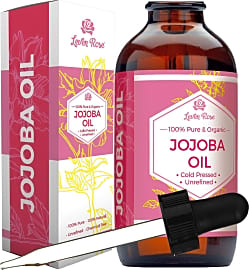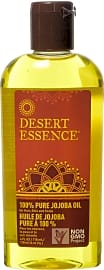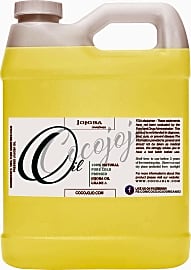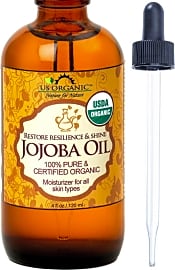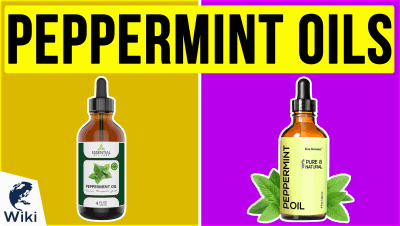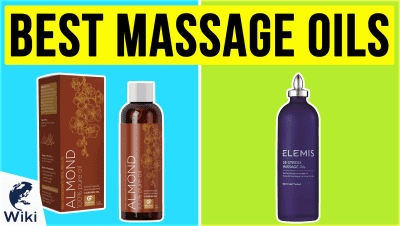The 10 Best Jojoba Oils

This wiki has been updated 42 times since it was first published in April of 2016. It's nice to see that many synthetic medications with all their nasty side effects are being eclipsed by their natural counterparts. These jojoba oils are a great example, as users report that they can relieve skin disorders, such as eczema and psoriasis, soothe dry skin, cure dandruff and itchy scalps, and even remove makeup as well as, if not better than, other options. When users buy our independently chosen editorial choices, we may earn commissions to help fund the Wiki.
Editor's Notes
February 05, 2020:
Jojoba oil is hailed for being safe for all skin types, non-comedogenic, suitable for nursing and pregnant mothers, and hypoallergenic. However, it still can be toxic if ingested orally, so never swallow it yourself and keep it far out of the reach of children and pets. And while allergic reactions are extremely rare, you never know, so patch test a small area in the inner portion of your arm near the elbow just to be sure.
Today's update saw the inclusion of Cocojojo Cleansing, which is a solid bulk option for entrepreneurs and DIY skincare enthusiasts who use jojoba oil as a carrier for essential oils or combine it with other ingredients to make scrubs, soaps, and more. Also joining the ranks today is Pura D’or Premium Grade, which comes from a company that goes above and beyond to satisfy the demands of the eco-conscious consumer, and Kate Blanc Cosmetics Radiant, an extremely pure option that comes in a 16-ounce bottle ideal if you use jojoba oil on a daily or weekly basis for your entire body and hair.
To make room for these new items, we said goodbye to Foxbrim Naturals Pure and Virginic Organic Essential, which became unavailable, and Dr. Adorable Golden Organic, which we feel does not go far enough to prove to customers that it is a quality, trustworthy company with the necessary certifications.
There are a lot of jojoba oils on the market, so our standards for this list were exceptionally high. We prioritized uncut, unrefined, cold-pressed, and virgin varieties that are not tested on animals and come from environmentally-conscious brands certified by multiple trusted agencies. We selected items with fair pricing, containers that are easy to dispense from, and dark bottles to protect the integrity of the contents from degradation from heat and light.
Choosing a Soothing Jojoba Oil
This makes it easier to justify the purchase of a more expensive option such as a smaller bottle of oil that has been USDA-certified as organic.
The jojoba shrub -- properly known as the Simmondsia chensis and colloquially called deer nut, wild hazel, and coffeeberry -- is native to the arid desert regions of northern Mexico and the southwestern United States. The foliage is a food source for many animals. Commercial production of the jojoba plant has expanded greatly in recent years, not for the shrub's leaves, but rather for its seeds. Roughly fifty percent of the seed of the jojoba plant is made up of a wax highly sought after by humans for use in cosmetics and medicinal applications. The non-digestible but nontoxic wax, usually called jojoba oil, has in fact become one of the best-selling natural health products available.
First, to set the record straight, there is a good chance you have long been pronouncing the name of this celebrated oil incorrectly. Derived from an O'odham Uto-Aztecan language, the word is not pronounced like the common name Joe, but rather is said Ho-Ho-Buh.
Jojoba oil acts as a topical emollient, helping to form a layer of oil atop the skin that reduces the loss of moisture that leads to chronically dry, irritated skin. The oil also adds a degree of its own moisture, offering immediate relief from irritation issues as well as longer-term benefits. While commonly found added to products ranging from shampoos to body lotions, many consumers prefer to use this oil in its pure and unadulterated form.
This oil is also noted for its impressive shelf life. Even when subjected to high and low temperatures (and temperature changes), jojoba oil remains stable and unspoiled for many years. This makes it easier to justify the purchase of a more expensive option such as a smaller bottle of oil that has been USDA-certified as organic.
Price rarely plays a prohibitive role in the purchase of this oil, however. Even the most expensive options are relatively cheap. The low price, minimal odor, and long shelf life of the jojoba plant's extract help to explain its popularity, as of course does the range of uses it offers -- see below for more information on how this oil is used.
Using Your Preferred Jojoba Oil
As noted, jojoba oil is not digestible, though it is technically edible. Thus the wax is perfectly safe for use in products that come into contact with almost all parts of the human body, including those that are spread over the lips and near the nose. In fact, pure jojoba oil makes a great balm for dry, cracked lips and for soothing the irritation caused to the philtrum by excessive nose-blowing during cold season. The oil can be applied as often as needed to reduce irritation the weather and/or health issues cause to the lips and nose.
Jojoba oil is also a great daily moisturizer regardless of the season. It can both mitigate existing skin issues, such as dryness and itching, and help prevent them from ever occurring in the first place. Many people spread the oil over their bodies as-is, but it can also be added directly to another moisturizer to enhance the efficacy of the product. Consider putting several drops of jojoba oil into each dollop of lotion and blending the mixture in your palms prior to application.
In fact, pure jojoba oil makes a great balm for dry, cracked lips and for soothing the irritation caused to the philtrum by excessive nose-blowing during cold season.
For many people, jojoba extract may well serve as an acne treatment for many skin types. Despite the fact the acne issues are usually caused by an abundance of oil on the skin, applying this unique oil can in fact reduce the oil produced by the skin -- called sebum -- thereby minimizing the occurrence of clogged pores and pimples. Jojoba oil can effectively fool the flesh into thinking it has produced enough oil for moisturizing and therefore curtail the overproduction of sebum that leads to acne. In other words, ironically the application of the oil may reduce the overall amount of oil present. And as the oil is non-comedogenic (e.g. will not block or clog pores), even if it does not markedly improve your acne issues, it is unlikely to exacerbate them either.
Those afflicted with particularly dry scalps or men prone to irritation caused by their facial hair can also find relief in a bottle of jojoba oil. Applied liberally to the scalp and/or face and rubbed into the roots of the hair, jojoba oil can provide quick relief from the itching caused by dandruff, and might even serve to reduce the flaking the condition creates for so many people. Consider both applying the oil directly to the skin and scalp and mixing it into haircare products, especially conditioners and even styling products that remain in contact with hair and flesh for extended periods of time.
The oil is also ideal for use during massage, both as a therapeutic aid that helps to soothe skin and simply to enhance the pleasure of the recipient and ease the work of the masseuse.
While wonderful and versatile in its pure form, jojoba oil inarguably makes a great addition to other products. For the person who makes his or her own skincare creations, adding jojoba oil as one of the ingredients is a safe, affordable way to enhance a formula. This oil can be added to balms, lotions, and other popular artisanal offerings. It can also serve as a base oil for solutions that will be enhanced with minute amounts of concentrated essential oils, such as lavender or rose.
A Few Words of Warning About Jojoba Oil
Jojoba oil is, for most intents and purposes, perfectly safe. That said, like most every product not specifically intended for use in the human eye, contact with the eyes must be carefully avoided. Accidental exposure necessitates flushing with clean water and, if possible, saline solution.
In truth, the only real dangers posed by jojoba oil are in its use as treatment for afflictions it cannot remedy; there is much misinformation present on websites, blogs, and in print that recommends this oil as a remedy for everything from sunburn to hair loss. Despite its many positive properties, jojoba oil can certainly not be expected to perform duties beyond the soothing of various skin issues related to dryness and irritation.
In rare cases, this oil will actually cause skin irritation. If you find that application of the oil leads to any rash, redness, itching, or other dermal issue, cease its use at once, wash the afflicted area with soap and water, and avoid its use in the future.



